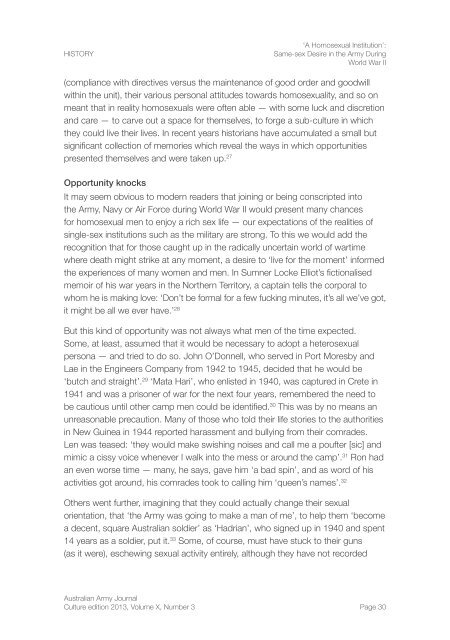Australian Army Journal
Australian Army Journal
Australian Army Journal
Create successful ePaper yourself
Turn your PDF publications into a flip-book with our unique Google optimized e-Paper software.
HISTORY<br />
‘A Homosexual Institution’:<br />
Same-sex Desire in the <strong>Army</strong> During<br />
World War II<br />
(compliance with directives versus the maintenance of good order and goodwill<br />
within the unit), their various personal attitudes towards homosexuality, and so on<br />
meant that in reality homosexuals were often able — with some luck and discretion<br />
and care — to carve out a space for themselves, to forge a sub-culture in which<br />
they could live their lives. In recent years historians have accumulated a small but<br />
significant collection of memories which reveal the ways in which opportunities<br />
presented themselves and were taken up. 27<br />
Opportunity knocks<br />
It may seem obvious to modern readers that joining or being conscripted into<br />
the <strong>Army</strong>, Navy or Air Force during World War II would present many chances<br />
for homosexual men to enjoy a rich sex life — our expectations of the realities of<br />
single-sex institutions such as the military are strong. To this we would add the<br />
recognition that for those caught up in the radically uncertain world of wartime<br />
where death might strike at any moment, a desire to ‘live for the moment’ informed<br />
the experiences of many women and men. In Sumner Locke Elliot’s fictionalised<br />
memoir of his war years in the Northern Territory, a captain tells the corporal to<br />
whom he is making love: ‘Don’t be formal for a few fucking minutes, it’s all we’ve got,<br />
it might be all we ever have.’ 28<br />
But this kind of opportunity was not always what men of the time expected.<br />
Some, at least, assumed that it would be necessary to adopt a heterosexual<br />
persona — and tried to do so. John O’Donnell, who served in Port Moresby and<br />
Lae in the Engineers Company from 1942 to 1945, decided that he would be<br />
‘butch and straight’. 29 ‘Mata Hari’, who enlisted in 1940, was captured in Crete in<br />
1941 and was a prisoner of war for the next four years, remembered the need to<br />
be cautious until other camp men could be identified. 30 This was by no means an<br />
unreasonable precaution. Many of those who told their life stories to the authorities<br />
in New Guinea in 1944 reported harassment and bullying from their comrades.<br />
Len was teased: ‘they would make swishing noises and call me a poufter [sic] and<br />
mimic a cissy voice whenever I walk into the mess or around the camp’. 31 Ron had<br />
an even worse time — many, he says, gave him ‘a bad spin’, and as word of his<br />
activities got around, his comrades took to calling him ‘queen’s names’. 32<br />
Others went further, imagining that they could actually change their sexual<br />
orientation, that ‘the <strong>Army</strong> was going to make a man of me’, to help them ‘become<br />
a decent, square <strong>Australian</strong> soldier’ as ‘Hadrian’, who signed up in 1940 and spent<br />
14 years as a soldier, put it. 33 Some, of course, must have stuck to their guns<br />
(as it were), eschewing sexual activity entirely, although they have not recorded<br />
<strong>Australian</strong> <strong>Army</strong> <strong>Journal</strong><br />
Culture edition 2013, Volume X, Number 3 Page 30

















